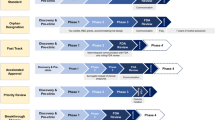Abstract
Available evidence indicates that patients who have private sector drug insurance are immediately covered for all new medically necessary drugs certified by Health Canada, with few exceptions. The experience for patients who are dependent on public drug programmes is much worse. Evidence indicates that, on average across the provinces, far less than half of the drugs certified by Health Canada are finally approved by the provinces for public reimbursement. Publicly insured patients also wait up to 1 year longer than privately insured patients to get insurance coverage for new drugs. Evidence also shows that public drug coverage varies widely across provinces.

Similar content being viewed by others
Notes
Some private plans exclude ‘non-medically necessary’‘life-style’ drugs.
‘Pharmaceutical’ drugs are chemical-based products; ‘biological’ drugs are biochemical-based products.
There are three classes of non-generic new drug approval submissions: new active substances, new drug submissions and supplemental new drug submissions.
References
DiMasi JA. Risks in new drag development: approval success rates for investigational drags. Clin Pharmacol Ther 2001: 69 (5): 297–307
Adams CP, Brantner VV. New drag development: estimating entry from human clinical trials [US Federal Trade Commission working paper 262]. Washington, DC: US FTC, 2003
Adams CP, Brantner VV. Estimating the cost of new drag development: is it really $802 million? Health Aff 2006; 25 (2): 420–428
DiMasi JA, Hansen RW, Grabowski HG, et al. Research and development costs for new drags by therapeutic category: a study of the US pharmaceutical industry. Pharmacoeconomics 1995; 7 (2): 152–169
DiMasi JA, Hansen RW, Grabowski HG. The price of innovation: new estimates of drag development costs. J Health Econ 1993; 22 (2): 151–185
Skinner BJ, Rovere M. Access delayed, access denied 2008: waiting for new medicines in Canada. Vancouver (BC): Fraser Institute, 2008 [online]. Available from URL: http://www.fraserinstitute.org/commerce.web/product_files/AccessDelay edAccessDenied2008.pdf [Accessed 2008 Jun 18]
iMAM® [propietary database]. Brogan Inc., 2007 [online]. Available from URL: http://www.broganinc.com/english/products/index.html [Accessed 2008 Jun 18]
Health Canada. 2006 Annual drag submission performance report: part I. Therapeutic products directorate. Ottawa (ON): Health Canada, Health Products and Food Branch, 2007 [online]. Available from URL: http://www.hc-sc.gc.ca/dhp-mps/prodpharma/applic-demande/docs/perform-rendement/ar-ra/ tpd_dpt_annual_annuel_07-eng.php [Accessed 2008 Jun 18]
Health Canada. 2006 Annual drag submission performance report: part II. Biologies and genetic therapies directorate. Ottawa (ON): Health Canada, Health Products and Food Branch, 2007 [online]. Available from URL: http://www.hc-sc.gc.ca/dhp-mps/prodpharma/applic-demande/docs/perform-rendement/ar-ra/bgtd_dpbtg_annual_annuel_07-eng.php [Accessed 2008 Jun 18]
Newhouse JP, Keeler EB, Willard Jr GM, et al. Free for all? Lessons from the RAND health insurance experiment: a RAND study. Cambridge (MA): Harvard University Press, 1993
Acknowledgements
The author declares no conflict of interest regarding the influence of either government or private sector sources of funding. The author freely discloses that his employer is a Canada-based, international, non-profit, non-partisan, independent public policy research organization that is funded exclusively through unrestricted private sector donations sourced from charitable foundations, non-governmental organizations, for-profit organizations and individual supporters.
Author information
Authors and Affiliations
Corresponding author
Rights and permissions
About this article
Cite this article
Skinner, B.J. Waiting for Reimbursement of New Medicines in Canada. Pharmacoeconomics 26, 629–632 (2008). https://doi.org/10.2165/00019053-200826080-00001
Published:
Issue Date:
DOI: https://doi.org/10.2165/00019053-200826080-00001




